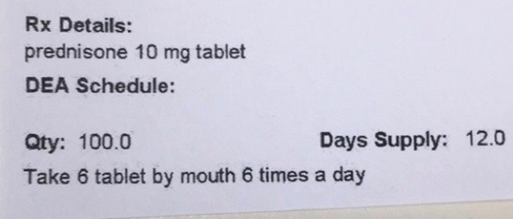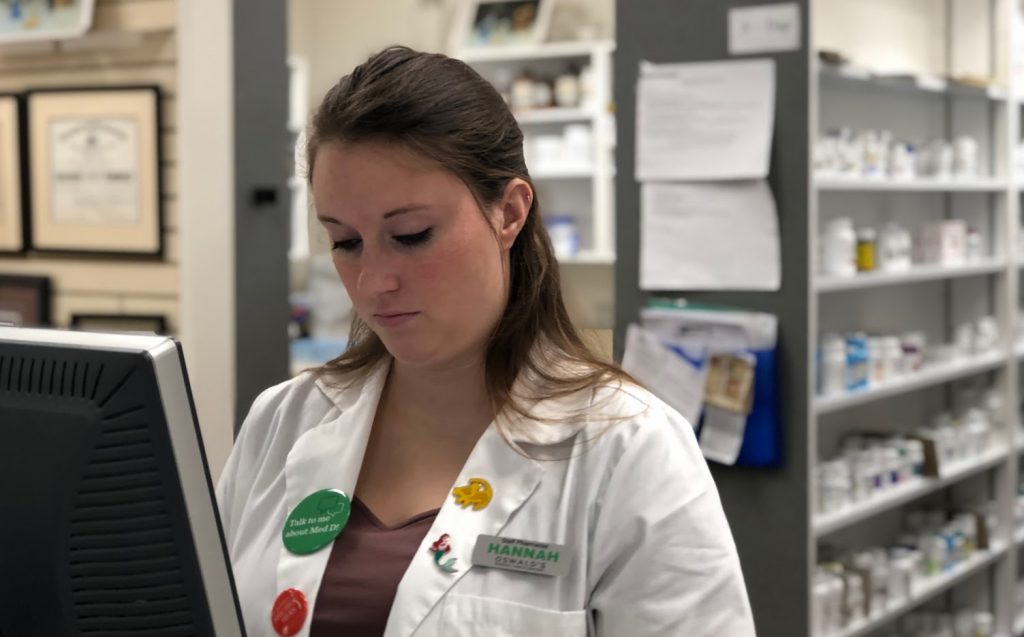Whenever someone asks me what I do for a living and hear that I’m a pharmacist, the follow up is what do I do all day besides “putting pills in a bottle.” I completely understand why people ask this question. Before I got into pharmacy, I thought all that happened behind the counter was pill-counting and talking on the phone. I didn’t realize how off-base my preconceptions were until I started attending pharmacy school.
To the outside eye, it can definitely look like all pharmacists do is count pills and stare at computers. Today, as a new pharmacist, I love explaining to people what it is I do all day behind the counter, as not many people realize the extent of what we can do for them (and you), our patients.
Pharmacist: A Constantly Evolving Job
The role of the pharmacist is one that is continually changing. I graduated from pharmacy school this past May, and in a few years my role as a pharmacist may change again as the healthcare system in the United States continues to evolve. Some states are even starting to allow pharmacists to prescribe certain medications!
No matter how much the role of pharmacist changes, one thing will always remain the same. That thing? Pharmacists are your drug experts. We go to school for 4 years to learn about medications. In addition to prescription medications, we also learn about over-the-counter medications—like those used for cough and cold, constipation, diarrhea, pain, allergies, and others.
We also learn about medications that fight specific conditions. From common conditions like diabetes and high blood pressure to rarer ones like Crohn’s and cystic fibrosis, we learn a lot. Having background on diseases helps us determine if the medication and dose are appropriate for your disease or condition.
Pharmacists also look over every prescription that comes through their pharmacy. As I mentioned previously, we are the drug experts, so we want to make sure that everything is correct on your prescription. We check each prescription to ensure that the drug choice, dosage, directions, and duration make sense for what is being treated. We also compare every new prescription to your other medications to make sure that there are no adverse interactions* between any of them. If any of our checks seem off or incorrect, we call the prescriber to clarify what they meant or ask them to prescribe a different medication.

An example electronic prescription where the doctor had to be called for clarification. Can you imagine taking 36 pills of anything, every day for 12 days?
Pharmacists Work to Save You Money
We also deal with insurance companies when issues arise, making sure your medications are covered. When a prescription isn’t covered by your insurance, we call your doctor to switch the medication to a covered one. If an uncovered medication is one-of-a-kind or doesn’t have a generic, we use “Prior Authorization.” Prior authorization is a process entailing a doctor contacting your insurance provider to explain why you need the medication. The goal of prior authorization is that the insurance company will cover the necessary medication.
We make sure that the correct medication is in the bottle, and that the label matches the prescription after your medication has been counted and labeled. If you are getting a new prescription filled, we are required by Illinois law to counsel you on the medication. We make sure we can answer any questions or concerns you have about medications before you start taking them.
Pharmacists and ‘Doctor’ Duties
As the role of the pharmacist evolves to let us be more involved with your health, new responsibilities have come into the picture. A new focus area for pharmacists is on patient immunizations. Pharmacies now administer flu shots. The flu shot window for 2018 is closing, but there is still time to get yours. Call us to see what you can do! The new shingles vaccine, which is still on national backorder, will also be available. Call us to see if we have it in stock.
At the end of the day, a pharmacist’s job is to help you, our patient. There are many things we can do to help you, but we wouldn’t be able to do it all without the help of our wonderful and hardworking technicians. We are here to answer any questions you may have about prescription medications, immunizations, over-the-counter medications, and more. If a technician is unable to answer a question, they will find a pharmacist who can.
Pharmacists can make recommendations, confer with your doctors to make sure your medications are appropriate and communicate with your insurance company when a drug is not being paid for. Our most impressive and overlooked talent, however, is our ability to read the doctor’s handwriting on your prescription. Seriously, there is a lecture on doctor handwriting at pharmacy school!
Definitions:
Interaction: when one drug affects another drug, food, or disease state. In terms of drug-drug interactions, the effects can be that the amount in the body of one drug can be increased to (sometimes) toxic levels, decreased to ineffective levels, or can cause general negative side effects if taken together.


